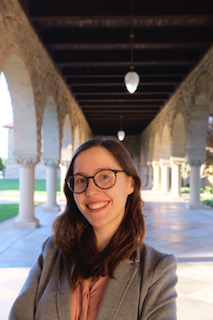
Right before applying to the GSE, I was working as a research and project coordinator at APTUS Chile. The focus of my job was studying practices related to initial and continuing teacher preparation, as well as the role of teacher educators in pre-service teacher education. Prior to that, I worked coordinating a national-scale practice-based teacher preparation program at the Chilean Ministry of Education, as a teacher coach in Enseña Chile (Teach for All local partner), and as a history and social science teacher in a high school in Santiago, Chile. When I decided to come back to school to get a master’s degree, I was convinced that if I wanted to have a more significant impact on teacher preparation and education policies, I needed to deepen my theoretical understanding and methodological skills.
Stanford caught my attention when looking for master’s degrees for many reasons. First and foremost, many people I admire studied or currently work there. Also, I was interested in joining a program where I could learn how to conduct rigorous research about teacher preparation by working closely with an expert in my field. I knew Stanford has one of the best initial teacher preparation programs in the world, and I wanted to have the opportunity to learn from people who were part of it. Finally, I wanted to be part of a diverse and small cohort with whom I could better understand the most complex international education issues and build strong relationships.
Now that this master’s degree is over, I am sure that I made the best decision for my future plans. I am amazed about how much I learned by conducting original research on initial teacher preparation and organizational change. Having had the opportunity to develop a paper on a topic I wanted to go deep in with the support of outstanding professors and critical/supportive classmates changed my view about what quality means in the research field. Nowadays, I feel better prepared to conduct rigorous research, critically consume academic literature, collect, and analyze data with time constraints, and communicate findings to make a real impact in the educational field. I am also grateful for the program’s structure which gave me plenty of opportunities to learn from my mistakes, receive feedback, and act upon it. It is incredible how much you can learn from sharing your work when you have a supportive group of people that want you to succeed.
Additionally, I am glad to have met excellent professors during this journey. While my main goal this year was to develop my research skills and gain more knowledge about teacher preparation, I was also interested in gaining more “practical” abilities and tools to be better prepared for the job market. In this regard, two courses were particularly helpful: Program Evaluation with professor María Ruiz-Primo and Qualitative Research with Ann Jaquith. Both courses helped me to think deeply and be mindful of every decision I made as a researcher and as a professional. Professors María and Ann were fantastic instructors who cared a lot about our learning process and pushed us to think rigorously and take care of details. While I had prior experience doing qualitative research and program evaluation, these courses gave me many tools and resources to be more creative, careful, and conscious when working with individuals and organizations.
In addition to all the learning I developed this year, the people I met made this experience much more powerful than I expected. My cohort’s profound commitment to education, generosity when sharing their prior knowledge, and willingness to collaborate to generate better opportunities for learning created the perfect atmosphere to share our thoughts, fears,
dreams, and joys. I learned so much from their views, feedback and research interests. I know I made friends for life, and I am so grateful for all the new insights I gained thanks to them, whether inside a classroom or in the many beautiful places Stanford offers.
In the future, I plan to continue researching the topics I am most interested in: teacher preparation, organizational learning, and school improvement. I hope to combine my experience as a teacher, teacher coach, program coordinator, and researcher to contribute to enhancing the collaboration between academia, teacher preparation, educational policies, and school communities. I am firmly convinced this is key to making transformations that impact all students equitably and fairly, ensuring all students can fulfill their potential.